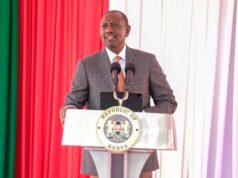
The Kenyan Treasury is gearing up for an upcoming withdrawal from the country’s foreign exchange reserves to meet external debt obligations amounting to Ksh63.5 billion ($451.3 million) this month. The majority of these funds will be allocated towards the biannual repayments of loans obtained from China for the standard gauge railway (SGR) project. An analysis conducted by the World Bank reveals that Kenya has significant debt payments due to various lenders, including France, China, the Eastern & Southern African Trade & Development Bank (TDB), Eurobond creditors, and the World Bank itself.
The SGR repayments, which occur in January and July, account for the largest outflows in debt service throughout the year. This month, approximately Ksh50.1 billion ($356.4 million) will be allocated towards SGR repayments alone. The impact of these substantial repayments on Kenya’s financial situation is amplified by the devaluation of the Kenyan shilling against the US dollar. Consequently, the Treasury needs to allocate more local currency to procure the required hard currency from the Central Bank of Kenya (CBK) to settle these external obligations.
To illustrate, in July 2022, Kenya’s external debt service charge amounted to $459.2 million, which, based on the average exchange rate of 118.30 during that month, was equivalent to Ksh54.3 billion. This implies that Kenya is spending an additional Ksh10 billion this month compared to July 2022, even though the actual dollar amount has decreased by $8 million.
The country’s Auditor-General has already highlighted the exchange risk associated with Kenya’s foreign debt portfolio, which surpassed Ksh5.09 trillion in April for the first time. The audit office revealed that in the first half of the 2022/23 fiscal year, the Treasury had to raise an additional Ksh3.4 billion to cover a shortfall in the budgeted foreign debt payments due to the depreciation of the shilling. As a result, the Auditor-General, Nancy Gathungu, advised the Treasury to consider hedging as a potential measure to mitigate this negative exposure to forex fluctuations on external debt.
Regarding the specific repayments scheduled for this month, China has the highest bill with $356.4 million (Ksh50.1 billion) in interest and principal repayments, followed by a semi-annual interest repayment of $31.5 million (Ksh4.4 billion) on the $1 billion Eurobond issued by the country in mid-2021. Other payments include $20 million (Ksh2.8 billion) to the TDB, $18.7 million (Ksh2.6 billion) to France, and $10.2 million (Ksh1.4 billion) owed to the International Development Association, the concessional lending arm of the World Bank.
These payments will be sourced from the official foreign exchange reserves held by the CBK, which the government utilizes for servicing external loans and importing essential goods like medication and fertilizer from the global market. As of the end of last week, the reserves amounted to $7.47 billion (Ksh1.05 trillion), sufficient to cover 4.12 months of imports.










